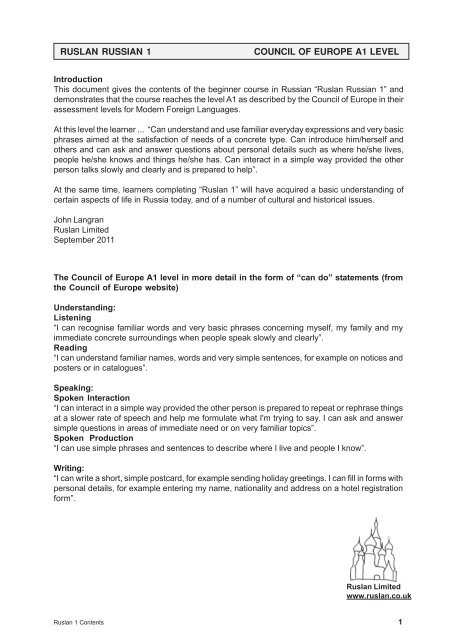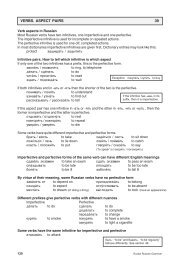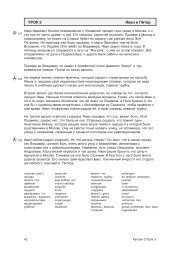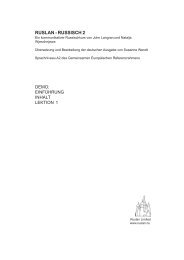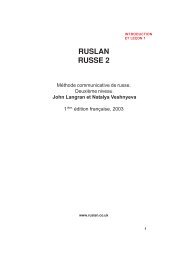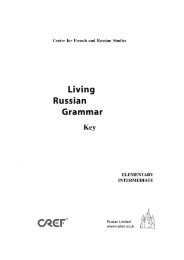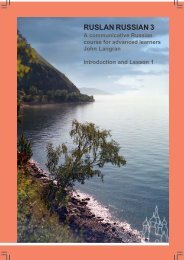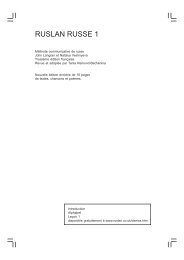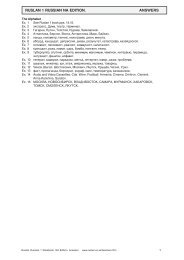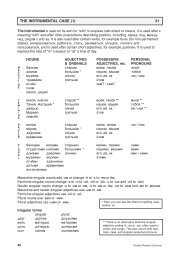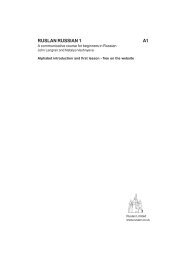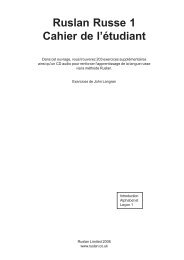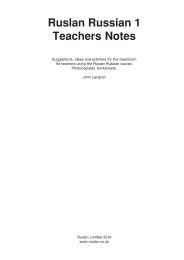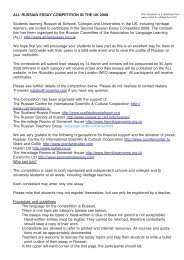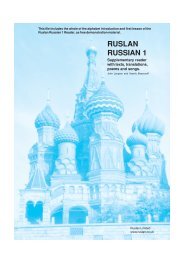Ruslan 1 English Contents.pmd - Ruslan Russian Language Services
Ruslan 1 English Contents.pmd - Ruslan Russian Language Services
Ruslan 1 English Contents.pmd - Ruslan Russian Language Services
Create successful ePaper yourself
Turn your PDF publications into a flip-book with our unique Google optimized e-Paper software.
RUSLAN RUSSIAN 1COUNCIL OF EUROPE A1 LEVELIntroductionThis document gives the contents of the beginner course in <strong>Russian</strong> “<strong>Ruslan</strong> <strong>Russian</strong> 1” anddemonstrates that the course reaches the level A1 as described by the Council of Europe in theirassessment levels for Modern Foreign <strong>Language</strong>s.At this level the learner ... “Can understand and use familiar everyday expressions and very basicphrases aimed at the satisfaction of needs of a concrete type. Can introduce him/herself andothers and can ask and answer questions about personal details such as where he/she lives,people he/she knows and things he/she has. Can interact in a simple way provided the otherperson talks slowly and clearly and is prepared to help”.At the same time, learners completing “<strong>Ruslan</strong> 1” will have acquired a basic understanding ofcertain aspects of life in Russia today, and of a number of cultural and historical issues.John Langran<strong>Ruslan</strong> LimitedSeptember 2011The Council of Europe A1 level in more detail in the form of “can do” statements (fromthe Council of Europe website)Understanding:Listening“I can recognise familiar words and very basic phrases concerning myself, my family and myimmediate concrete surroundings when people speak slowly and clearly”.Reading“I can understand familiar names, words and very simple sentences, for example on notices andposters or in catalogues”.Speaking:Spoken Interaction“I can interact in a simple way provided the other person is prepared to repeat or rephrase thingsat a slower rate of speech and help me formulate what I'm trying to say. I can ask and answersimple questions in areas of immediate need or on very familiar topics”.Spoken Production“I can use simple phrases and sentences to describe where I live and people I know”.Writing:“I can write a short, simple postcard, for example sending holiday greetings. I can fill in forms withpersonal details, for example entering my name, nationality and address on a hotel registrationform”.<strong>Ruslan</strong> Limitedwww.ruslan.co.uk<strong>Ruslan</strong> 1 <strong>Contents</strong> 1
THE RUSSIAN ALPHABETthe letters of the <strong>Russian</strong> alphabet and their soundsthe pronunciation of the <strong>Russian</strong> letters in international wordsrecognition of international words and easy street signsLESSON 1 ÀÝÐÎÏÎÐÒ THE AIRPORTIvan and Lyudmila meet on the plane and then arrive at Moscow Sheremetyevo airportGrammar and Vocabulary airport vocabulary: masculine and feminine nouns the pronouns îí and îí‚, meaning “he” and “she” respectively, and both meaning “it” possessive adjectives: ìîé / ìîµ - “my” and âàø / â‚øà -”your” the <strong>Russian</strong>s have no word for “the” or “a” the verb “to be” is not used in the present tense the intonation rises when you ask a question the names of <strong>English</strong>-speaking nationalitiesCommunication greeting someone getting attention thanking someone asking for information (Is that ...? / Where is ...? / Are you ...?) answering “yes” or “no” to a question understanding place names and messages at an airport reading notices at the <strong>Russian</strong> airport, and understanding several place names writing some more <strong>Russian</strong> letters, and your nameBackground information MoscowLESSON 2 ÓËÈÖÀ THE STREETIvan finds his way from Sheremetyevo airport to Arbat, a street in the centre of old Moscow.Grammar and Vocabulary how to use the prepositions â and íà meaning “to” a place how to say “I know” and “you know” - ÿ çí‚þ / âû çí‚åòå imperatives: Ñêàæ‰òå! - Èä‰òå! - Èçâèí‰òå! - ×èò‚éòå! the negative pronoun îí‹ and some neuter nouns åñòü meaning “there is” the numbers 0 - 10.Communication asking for directions understanding and giving simple directions saying that you do not understand something reading the names of towns, addresses, street signs writing some more <strong>Russian</strong> lettersBackground information Arbat Street Bulat Okudzhava2 <strong>Ruslan</strong> 1 <strong>Contents</strong>
LESSON 3 ÑÅÌÜß THE FAMILYIvan arrives at Zoya Petrovna’s flat and meets Lyudmila again. He needs somewhere to stay.Grammar and Vocabulary the genitive singular of masculine and feminine nouns the genitive of personal pronouns - ÿ, âû (ìåíµ, âàñ) the prepositions èç, îò, äî, äëÿ, ó with the genitive the spelling rule for the use of the letters û and è expressing absence or non-possession with íåò and the genitive the genitive after the numbers 2,3,4 some common words of foreign origin that never change their ending how to use ì‹æíî and íåëüçµ with ìíå and âàì to mean “I can”, “you may not”, etc. vocabulary for family membersCommunication introducing yourself, introducing someone else expressing surprise asking for something saying that something can or cannot be doneBackground information the <strong>Russian</strong> name systemLEKTION 4 ÃÄÅ ÂÛ ÁÛËÈ? WO WAREN SIE?Still at Zoya Petrovna’s flat, Ivan meets Vadim.Grammar and Vocabulary the prepositional case used with â and íà meaning “at” a place verb infinitives ending in -àòü, -èòü and -åòü the basic rules of the past tense the genitive singular ending of feminine nouns in -èÿ the full present tense of the verb çíàòü - “to know” the personal pronoun òû for the familiar form of “you” the familiar form of the imperative - Ñìîòð‰! numbers 10-100 months of the year the names of countries and languagesCommunication saying what you were doing saying where you were expressing joy expressing an opinion saying how well you can speak a foreign languageBackground information<strong>Russian</strong> National Holidaysthe New Year and Christmas in Russia<strong>Ruslan</strong> 1 <strong>Contents</strong> 3
LESSON 5 ÃÎÑÒÈÍÈÖÀ THE HOTELIvan checks in to the Hotel Mars, finds his room, and telephones Lyudmila to invite her out.Grammar and Vocabulary the short adjectives îòêð›ò - “open” and çàêð›ò - “shut” the present tense of the verb ãîâîð‰òü - “to speak” or “to say” the use of ó ìåíµ and ó âàñ to convey “I have” and “you have” the use of c with the genitive meaning “from” a note on imperfective and perfective verb aspects the days of the week some professions and places of workCommunication booking a hotel room making inquiries (Is there ...?) booking tickets for an event asking whether a place is open / closed expressing regret apologising inviting and accepting an invitation filling in a hotel registration formBackground informationHotels in RussiaThe Department Store GUMThe KremlinLEKTION 6 ÐÅÑÒÎÐÀÍ THE RESTAURANTIvan and Lyudmila are in the restaurant of the hotel “Mars”. Just as they are starting their meal,who should arrive but Vadim with a new companion!Grammar and Vocabulary present tense forms of the verbs õîòˆòü - "to want" and èäò‰ - "to go by foot" the imperative forms Ä‚éòå ... ! - "Give (me) ...!” and Ïðèíåñ‰òå ... ! - "Bring (me) ...!” neuter noun endings the neuter forms of the possessive adjectives ìîé and âàø: ìî¸, âàøå the accusative singular of nouns adjectives in the nominative case the question word êàê‹é - “which” vocabulary for food and drinkCommunication ordering a meal in restaurant expressing surprise / astonishment refusing an invitation and saying goodbye asking for an explanationBackground information <strong>Russian</strong> food The <strong>Russian</strong> poet A.S. Pushkin "<strong>Ruslan</strong> and Lyudmila" by PushkinSong«Ñòåïü äà ñòåïü êðóã‹ì» - “The Steppe all around”4 <strong>Ruslan</strong> 1 <strong>Contents</strong>
LESSON 7 Î ÑÅÁÅ ABOUT ONESELFIvan and Lyudmila are still in the restaurant, and start talking about their lives and interests.Lyudmila has to leave when things get serious, and Ivan hurries to pay the bill.Grammar and Vocabulary neuter forms of verbs the preposition î - “about” with the prepositional case nouns that end with a soft sign -ü neuter nouns ending in -ìÿ impersonal expressions and adverbs formed from adjectives: èíòåðˆñíî - “it is interesting” numbers above 100 professionsCommunication making a compliment talking about yourself (home, work, hobbies, daily routine) describing a town asking for the bill in a restaurant saying where you are going suggesting where you can go togetherBackground information the river VolgaLESSON 8 ÂÐÅÌß THE TIMEPeter arrives in Moscow and makes contact with Vadim and Lyudmila. Ivan invites Lyudmila out tothe opera.Grammar and Vocabulary telling the time in whole hours the nominative plural of nouns and adjectives the genitive plural of masculine nouns. the short adjective í˜æåí - “necessary” short adjectives in the plural the irregular verb ìî÷ü - “to be able to”Communication making a phone call arranging to meet (place, time, exchanging phone numbers) saying that you need something inquiring after someone’s health inviting someone out reading <strong>Russian</strong> family namesBackground information Information about the telephone in Russia <strong>Russian</strong> time zones<strong>Ruslan</strong> 1 <strong>Contents</strong> 5
LEKTION 9 ÒÅÀÒÐ THE THEATREIvan and Lyudmila are at the opera. Lyudmila doesn’t like the seats, but she does enjoy theperformance.Grammar and Vocabulary reflexive verbs in the present tense, for example íà÷èí‚òüñÿ - “to begin” the dative singular of nouns the prepositions ïî - “along”, and ê - “towards”, used with the dative the verbs ëþá‰òü - "to love", and íð‚âèòüñÿ - "to please", used indirectly for “to like” the verb èãð‚òü with â and the accusative - "to play a sport" the verb â‰äåòü - "to see" the use of ðàç - “a time” the names of sportsCommunication expressing pleasure and displeasure reading a theatre programme saying which sports you play or playedBackground information SnegurochkaLESSON 10 ÄÎÌ THE HOUSELyudmila has a meal with her friend Tamara and talks about her trip to England. Tamara is interestedin Lyudmila’s male friends and would like to meet them. Lyudmila gets back to Zoya Petrovna’s flatvery late.Grammar and Vocabulary the instrumental singular of nouns. the spelling rule for the unstressed letter î the genitive plural of feminine nouns, of masculine and feminine nouns that end in a soft sign,and of masculine nouns in -æ, -÷, -ø and -ù the verb èãð‚òü with íà and the prepositional - "to play an instrument" the verbs ñïàòü - “to sleep”, ïåòü - “to sing” and ïèòü - “to drink” the declension of personal pronouns the names of musical instrumentsCommunication thanking someone for something describing a flat or a house, and the garden talking about which musical instruments you and others can playBackground information housing in Russia a typical <strong>Russian</strong> flatGRAMMAR REFERENCEA summary of the main grammar points in <strong>Ruslan</strong> <strong>Russian</strong> 1RUSSIAN - ENGLISH DICTIONARY850 words6 <strong>Ruslan</strong> 1 <strong>Contents</strong>


